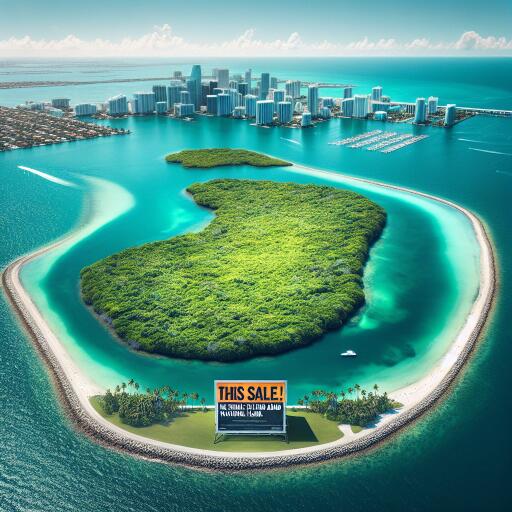
Sale of Natural Island in Biscayne Bay Sparks Controversy
The real estate market’s fervor has reached the tranquil waters of northern Biscayne Bay, Miami, with the proposed sale of Bird Key, the area’s sole natural island. At the heart of the uproar is not just the island’s hefty $31.5 million price tag, but its irreplaceable environmental and historical significance to southern Florida.
For over four decades, the Matheson family has been the custodian of this 37.5-acre oasis. With real estate prices climbing, Finlay Matheson sees the current market as an opportune moment to sell the land that he acquired in 1985 for a modest $36,000. “The real estate market today is hot, so why not sell it?” Matheson remarked, citing the substantial return on investment and the property’s current standing under his children and a partner’s ownership.
This decision, however, has sounded alarms among local conservationists and environmental advocates. José Francisco Barro, a dedicated conservationist and president of the Tropical Audubon Society focused on the region’s ecosystem preservation, highlighted Bird Key’s critical role as a sanctuary. “It’s a place where birds and marine birds can rest and nest,” he explained, underlining the island’s status on Miami-Dade County’s list of environmentally threatened lands.
While the island remains privately owned, speculation about its future development has raised concerns over potential environmental damage. Barro warned, “Any development could result in the loss of not only the island but also part of the bay’s waters, which are a haven for marine life including manatees, as well as various bird species.”
The office of Miami-Dade Mayor Daniella Levine Cava has taken notice of the burgeoning issue, acknowledging attempts to negotiate the purchase of Bird Key. “My administration has been closely monitoring the situation at Bird Key and made a purchase offer that unfortunately did not meet the owner’s expectations,” Mayor Levine Cava expressed. She emphasized Biscayne Bay’s fundamental role as a recreational, economic, and ecological cornerstone in the county, housing iconic species and critical storm-mitigating mangrove forests.
The mayor’s office remains committed to exploring alternative means, including seeking state or federal assistance, to secure the property’s acquisition in efforts to bolster Biscayne Bay’s conservation initiatives.
Highlighting the island’s significance, a 2019 clean-up effort led by Christopher Boykin, executive director of the Pelican Harbor Seabird Station, brought to light the extent of neglect Bird Key has suffered. Mobilizing roughly 25 volunteers, the team removed 1.4 tons of debris, ranging from tires to patio furniture and myriads of litter accumulated since the 1980s. Boykin, speaking on the island’s unique place amidst Miami’s urban sprawl, said, “Bird Key is truly a special and magical place…with so much concrete and population, having this biodiversity and richness of life is really something extraordinary.”
As the debate over Bird Key’s future unfolds, it resonates as a broader reflection on balancing development and conservation, underscoring the delicate interplay between natural sanctuary spaces and the pressures of real estate development in environmentally rich locales.





Leave a Reply